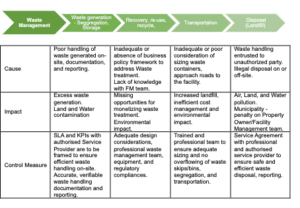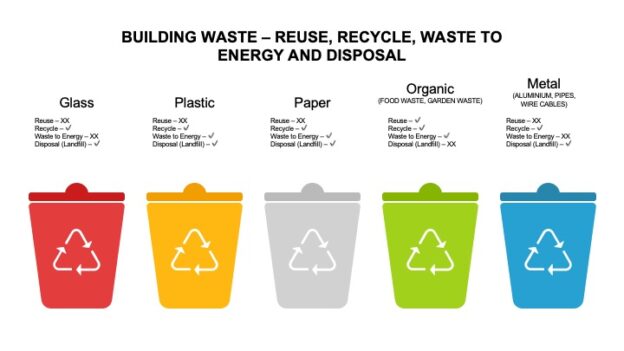The World Bank’s report, “What a Waste 2.0”, provides a staggering statistic: every year, the world generates a whopping 2.01 billion tons of municipal solid waste. Even more concerning is that at least 33% of this waste is not being managed in an environmentally safe manner. This highlights the urgent need for effective waste management practices.
Throughout its operational phase, it is estimated that an office building or industrial unit will produce an average of 0.05 cubic meters of waste per every 10 square meters of floor area (or per person) per week. This waste can come in many forms, such as paper, plastic, food, and electronic waste. Those managing these facilities need to be aware of this waste generation rate to adequately address and manage the waste produced, whether it be through recycling programs, waste reduction initiatives, or proper disposal methods. (source: BS 5906)
Managing waste generated by buildings and industrial infrastructures is a topic of increasing concern due to its environmental and economic impact. To address these concerns, Facilities Management service teams oversee the stages of waste management that arise during civil infrastructure projects, including construction, deconstruction, demolition, building systems operations, maintenance, and disposal. Achieving efficient waste management requires a comprehensive understanding of local rules and regulations and a science- and technology-based approach.
This article provides a comprehensive overview of the classification of waste generation, the control tools, and the reporting framework necessary for effective waste management in facilities management. By setting facility-specific guidelines, Facilities Managers can ensure that waste is managed responsibly and sustainably, thus minimising its adverse environmental impact and promoting economic efficiency.
Some interesting facts about the Global Waste Management

Waste Management Operating Process Gaps – Causes, Impacts, and Control Measures.


Efficient waste management is a critical aspect of sustainable environmental management. Complying with regulatory frameworks, implementing best practices in business operations, and understanding the technical know-how to manage waste effectively is imperative. By adopting these measures, we can work towards building a cleaner and greener future.

